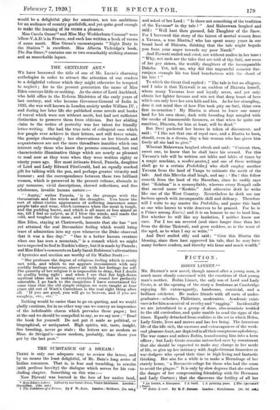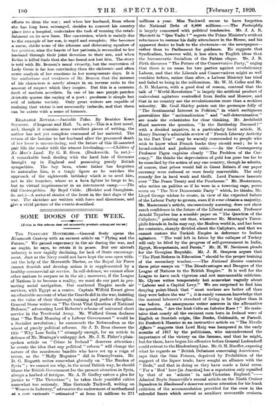FICTION.
ROBIN LINNET.**
ME. BENSON'S new novel, though named after a young man, is much more closely concerned with the emotions of that young man's mother. Robin Linnet, the only son of Lord and Lady Grote, is at the opening of the story a freshman at Cambridge enjoying life extravagantly, handsome, convivial, and a brilliant cricketer. He makes friends with all sorts of under- graduates—scholars, Philistines, modernists. Academic exist- ence is for him a carnival of revelry and "ragging." Incidentally we are introduced to a group of dons, obscurantists wedded to the old curriculum, and quite unable to read the signs of the times. Equally detached from realities is the set in which Helen, Lady Grote, lives and moves and has her being. The luxurious life of the idle rich, the excesses and extravagances of the week- end pleasure-hunt, are depicted in all their sumptuous upholstery. The war comes and sobers Robin, transforming him into a keen officer ; but Lady Grote remains untouched save by resentment that she should be expected to make any change in her mode of life, or give up her intimacy with Anglo-German financiers or war-dodgers who spend their time in high living and fantastic thinking. Her aim for a while is to make a Hermitage of her stately home, " a Boccaccio-refuge for those who had the sense to avoid the plague." It is only by slow degrees that she realizes the danger of her compromising friendship with Sir Hermann and Lady Gartner ; that she discovers the futility of all her • An Ionian, a European. t A bard. t A printing press. f Tile Poets. •• Robin L'nnet. By E. F. Benson. London : Hutchinson. [Si. W. nel.1 efforts to shun the war ; and when her husband, from whom she has long been estranged, decides to convert his country place into a hospital, undertakes the task of running the estab- lishment on its new lines. Her • conversion, which is mainly due 7to idle example of her son, is rapid and complete. She becomes a nurse, shirks none of the irksome and distressing squalors of her position, wins the hearts of her patients, is reconciled to her husband -through their joint devotion to their son, and when Robin is killed finds that she has found not lost him. The story is-told with Mr. Benson's usual vivacity, but the conversion of Lady .Grote is far less convincing than the-elaborate and often acute analysis of her emotions in her unregenerate days. It is the misfortune and weakness of Mr. Benson that the interest of his characters is nearly always in an inverse ratio to the amount of respect which they inspire. But this is a common fault of modern novelists. In one of his rare purple patches Aristotle quotes the saying of a poet : goodness is simple but evil of infinite variety. Only great 'writers are capable of realizing that virtue is not necessarily 'imbecile, and that there can be saints -with a sense of humour.







































 Previous page
Previous page